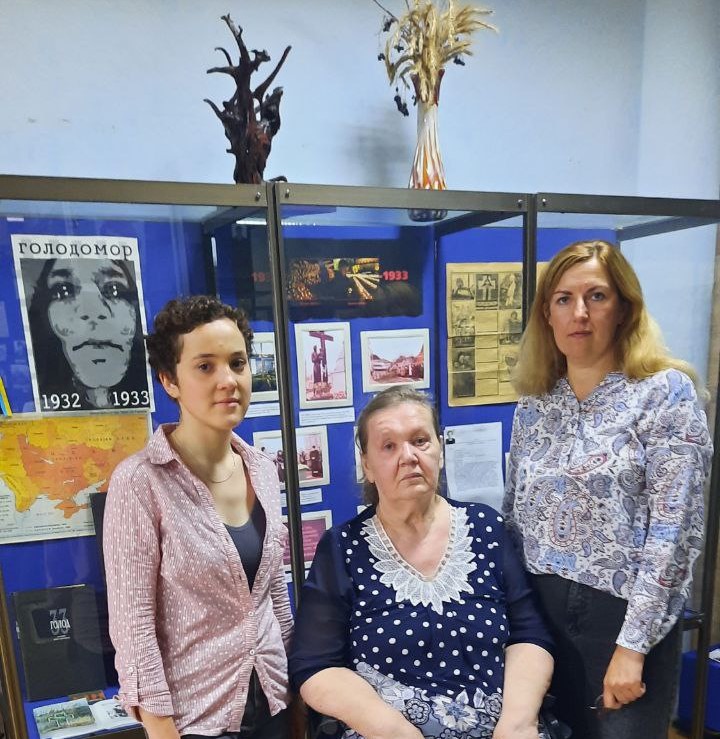Our colleagues met with Maria Ovdiienko, a well-known Holodomor researcher in Brovary
The staff of the Holodomor Oral History Department visited Brovary and recorded a long interview with the famous local historian and researcher of the Holodomor Maria Ovdiienko, a woman who is, without exaggeration, legendary in her town.
Ms Maria remembers, in February 2008, coming to work at the Brovary Museum of Local Lore as a senior researcher. It was a time when special attention was drawn to the Holodomor topic. It was during that period that the construction of the Holodomor Museum started, the Soviet archives were declassified and work on filling the National Book of Memory of the Holodomor Victims continued on the ground.
Maria Ovdiienko also got involved in this work. Subsequently, on the basis of the testimonies collected in Brovary at that time, Ms Maria wrote the book “Frescoes of Hunger”, published only in 2017 – for the previous authorities of the city, such a book was “out of time”. Interviewing local old-timers, the local expert also identified two mass burial sites in Brovary and ensured that memorial signs to the Holodomor victims appeared there.
Ms Maria was also the initiator of commemorating Holodomor researcher James Mace in the city. Thus, Brovary became the first city in Ukraine where a street was named after an American researcher.
Such attention of the woman to the Holodomor topic is not accidental because her family also experienced it in the village of Trebukhiv in the Kyiv region. Maria Hryhorivna’s father survived thanks to his neighbours: exhausted, he crawled out of the house, where his fellow villagers, who lived nearby, noticed him. They brought him to their house and fed him with what they had – a liquid soup made from grains and chaff… Ms Maria still chastises herself for not even knowing the last names of her father’s saviours, without whom there would be neither her nor the continuation of their family.
Speaking about her research work on the Holodomor topic, Ms Maria notes: “Now the innocents who died of hunger will set free not only my soul, but also the souls of all the Brovary residents who are alive now, who remember and pray for them.”
The story of Maria Ovdiienko’s own life, which she told us, is also special. Because of her pro-Ukrainian views, she was persecuted during the Soviet years. In particular, she could not enter the university in Kyiv, so she went to do in Odesa. But in 1972, she was expelled from Odesa University for… “failure”, but, in fact, due to the order of the KGB. Four years later, she managed to return to higher education, but on the condition that she would transfer to another institution. By some miracle, she was lucky enough to transfer to my dream Taras Shevchenko Kyiv University, where she graduated in 1980. After university, she worked as a teacher at a school and then at the Kyiv Regional Department of Education, but she was fired for implementing patriotic educational projects. With the restoration of independence, she created a local branch of the Taras Shevchenko Society of the Ukrainian Language in Brovary and was one of the organizers of the People’s Movement of Ukraine in the city, in 1997, she registered the publishing house “Ukrainian Idea”…
We sincerely thank Ms Maria for the interesting talk, memories and the book “Frescoes of Hunger” given to us. At the same time, we would like to thank the Brovary Museum of Local Lore, where our meeting and recording of the interview took place and its director Ihor Krepak. We used the opportunity to hand over the books published by the Holodomor Museum to our colleagues from Brovary.
